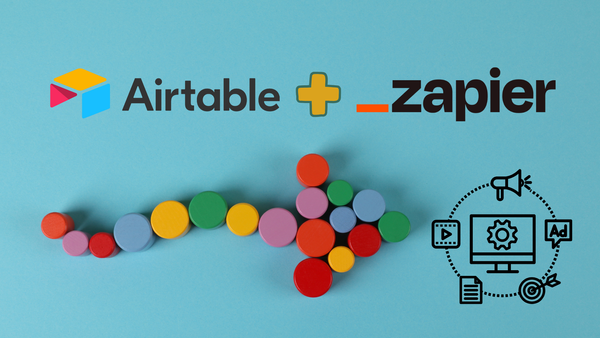My Q1 Freelancer OKRs (And Why I Have Them)
Feeling adrift in your freelance career? You’re not alone.

Two years into freelancing, I find myself missing something unexpected from my agency days – OKRs. Not the endless meetings about them or the corporate jargon that often came with them, but the clarity and direction they provided. When I was part of a content team, OKRs helped us stay focused and measure what mattered. But now, working solo with my rescue pup Zagreus as my only "team member," I realize that I need that structure now more than ever.
When I transitioned to freelancing, I left behind a lot of those structured frameworks. My goals became a bit looser. And while I appreciated the flexibility, I started to notice something: without clear objectives, it's way too easy to end up doom-scrolling LinkedIn instead of actually growing your business. (Speaking from experience here!)
So, I decided to take what worked from my agency experience and adapt it for my solopreneur reality. No more vanity metrics or goals set to please stakeholders — just honest, actionable objectives that would help me build the business and life I want.
What Are OKRs, and Why Should Freelancers Care?
As freelancers, we’re used to setting goals. But how often do we take the time to really track our progress toward achieving them? That’s where OKRs (Objectives and Key Results) come in. Popularized by companies like Google, OKRs are a goal-setting framework that can help freelancers stay focused and grow their businesses.
The beauty of OKRs is their flexibility. They can be tailored to your professional and personal goals, whether it’s growing your revenue, building your brand, or maintaining your creativity. And unlike corporate OKRs, no one's going to schedule a three-hour meeting to discuss why you only achieved 70% of your target. (Though Zagreus does sigh and give me judgmental looks when I'm working late.)
In this article, I’m sharing my personal OKRs for this quarter to give you a real-life example of how to make this framework work for you.
Business OKRs for Freelancers
These are my personal OKRs for this quarter. I'm sharing them because transparency helps us all grow, and maybe they'll inspire your own goal-setting journey.
Objective: Expand Client Base
Growing sustainably means keeping your existing clients happy while strategically adding new ones. It's not about chasing every potential client — it's about finding the right ones.
- KR: Maintain client retention rate of 80%
- Ensuring clients stick around is just as important as landing new ones. I’ll focus on adding consistent value over time and maintaining proactive communication. One way I’m trying to add value is by delivering projects ahead of schedule whenever possible.
- KR: Receive at least one testimonial from a client
- Testimonials help build credibility and attract new clients. To achieve this, I make it a habit to request feedback about 6 months into a partnership, and ask clients if they’d be willing to share their experiences publicly on my portfolio site. I've recently started using Senja (affiliate link) to do this, and I'm pretty pleased with the experience so far.
- KR: Pitch 3 ideal-fit clients every month
- Consistent pitching keeps the pipeline full. I'll be identifying companies that align with my skills and values, then crafting personalized pitches that demonstrate how I can solve their specific problems. (And yes, I still clench my cheeks every single time I hit "send.")
- KR: Sign 5 new clients in Q1
- This is a measurable way to track my client acquisition efforts. I’ll focus on warm leads, follow up on cold pitches, and leverage my network and referrals to reach this goal.
Objective: Strengthen Personal Brand
If it were up to me, I would freelance in a vacuum. Unfortunately, I have to be obnoxious and build a brand about who I am and what I have to offer. Despite my allergy to self promotion, I’m planning on strengthening my personal brand this quarter to simultaneously strengthen my business.
- KR: Post on LinkedIn three times a week
- Staying visible on LinkedIn is key to building my brand. I've been participating in Buffer's Creator Camp this month, so it's been easy to hit this goal so far, posting every day. Let's hope I keep it up after Creator Camp ends!
- KR: Reach 3,000 followers on LinkedIn
- Real talk: I used to think LinkedIn followers were just a vanity metric, until I realized how many amazing connections and opportunities come through the platform. I'll grow this organically by sharing actual valuable insights (not just "hustle culture" nonsense), and being the person I needed when I first started freelancing.
- KR: Grow cmd + create newsletter to 100 subscribers
- I'll promote my monthly newsletter through this blog and LinkedIn posts, offering consistently valuable content that helps other freelancers avoid the mistakes I've made (and there have been many).

Objective: Maintain Work-Life Balance
Because apparently, answering client emails at 3 AM while stress-eating Oreos isn't a sustainable business strategy. Who knew?
- KR: Maintain 20-hour workweeks
- Listen, I adore my 20-hour workweeks and I want them to stick around. I’ll achieve this by setting clear boundaries and optimizing my workflows, batching work for those hardcore heads-down writing sessions.
- KR: Don’t work on weekends
- Taking weekends off guilt-free will be essential for recharging. Weekends are now sacred "no-client-work" zones. Emergency? That's what Monday is for.
Objective: Achieve Better Financial Stability
Because my anxiety would really appreciate knowing we don't have to worry about paying the bills this month.
- KR: Grow monthly revenue to $9,000
- This isn't just a random number I pulled out of thin air — it's calculated based on what I need to cover my expenses and what I'll be able to put away and save for my upcoming tax bill. (Big oof, more to come on that later.) I’ll focus on high-value clients, build out my retainer packages, and upsell services to existing clients to achieve this goal.
- KR: Convert one project-based client to a retainer
- I'll identify clients who could benefit from ongoing services and propose tailored retainer packages. No more feast-or-famine cycles, please and thank you.
- KR: Structure my retainer offerings
- Creating clear retainer packages makes it easier to pitch ongoing work. I’ll define deliverables, set pricing, and outline the value clients will receive.
Objective: Encourage Personal Growth and Creativity
Because all work and no play makes this freelancer very dull (and slightly unhinged).
- KR: Color at least one page per week
- My collection of alcohol markers isn't just for show (though they do look pretty on my desk). Coloring is my meditation, my creative reset button, and sometimes my only guarantee that I'll create something beautiful that day. This is non-negotiable self-care time.
- KR: Complete a GA4 course
- Look, I've been avoiding Google Analytics 4 like it's a client who wants to "hop on a quick call" at 9 p.m. But it's time to face the music and actually learn how this thing works. If my clients are using it, I need to understand it better.
- KR: Publish a blog post on command + create twice a week
- This is where I get to be fully myself – no client briefs, no brand guidelines, just honest conversations about freelance life. Plus, it forces me to reflect on what I'm learning and share it with others who might be struggling with the same things. I’ve been planning content in advance and setting aside time each week to write and publish.
Keeping Track of My OKRs
OKRs aren’t just a “set it and forget it” system. To make sure I’m making progress, I do a weekly review of my key results. Here’s how I stay on track:

- OKR System: I’ve implemented an OKR checklist in Todoist, with recurring tasks that I can check off.
- Weekly Review: Every Friday, I’ll spend 15-20 minutes reviewing my OKRs. I’ll check off any completed KRs and adjust my approach if I’m falling behind.
- Celebrate Small Wins: It’s important to celebrate progress, even if it’s incremental. Whether it’s signing a new client or hitting a revenue milestone, I’ll make time to acknowledge these achievements.
Making It Personal
Your OKRs should reflect your version of success. For me, success means having free time to build mechanical keyboards, color, and do my Duolingo, while still delivering exceptional work to clients. My OKRs are about building a business that fits into my life, not the other way around.
Your success metrics will probably look different, and that’s exactly as it should be. The point is to create objectives that actually matter to you, not what some LinkedIn guru (yes, me included) says you should care about.
Track what matters, and make it work for you.





